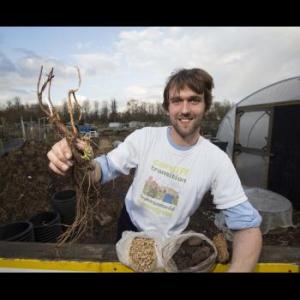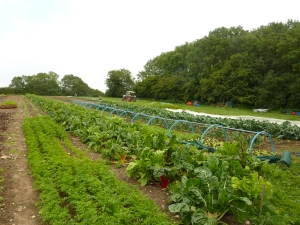Urban community farming ‘greens’ Wales
Leave a commentFebruary 26, 2015 by THE WELSH HORIZON
Urban community farming and sustainable food production are gaining popularity in Wales, with third sector projects aiming to achieve self-sufficiency and promoting greener communities.
Organisations like Farm Cardiff, Cardiff Transition and Food Cardiff have been actively engaged in developing projects to produce local food and raise awareness.
Sam Holt, South East Wales development officer for the Federation of City Farms, and core member of Cardiff Transition, said: “We currently have 49 community growing projects that are registered in Cardiff. I also run community mapping walks in the city and across South East under Farm Cardiff and EggSeeds (developed for schools), looking at potential space to grow food and mapping them.”
Food Cardiff which encourages affordable food growing locally already has 25 food co-operatives in Cardiff, making vegetables and fruits available to the public.
Green Wales – a possibility
Mr Holt was a medical student when he decided to get actively involved in community projects two and a half years ago. He started out as a volunteer on the Riverside Communities Project and now runs his part-time business Eggseeds, which runs ‘Grow your own potatoes’ project in schools.
He says: “School kids get excited while growing potatoes. As they figure out they can grow potatoes, they ask what else they can grow. We simply teach them how to grow it on their own in easily accessible spaces like in their backyard, using the right techniques.”

Sam Holt Picture courtesy of Cardiff Transition
Pat Gregory, another core member at Cardiff Transition, said: “Our first project was ‘Can Cardiff Feed Itself?’ We researched and organised an event with speakers who gave talks on the area of land needed to feed Cardiff, other urban food growing projects around the world, composting human waste for fertilizing and the people side of local food growing – co–ops and other good models.”
The research was conducted by an organisation called the Pea Pod, which suggested Cardiff could feed itself for years to come, with a futuristic and sustainable diet.
Mr Holt said Cardiff has an abundance of open spaces, which could easily be used for growing crops.
“Farm Cardiff is a community group that came together through Cardiff Transition, to help people reconsider their lifestyle and how they can make it better,” he added.
“People tend to associate farming with growing crops or rearing animals on a farm. So we wanted a name that reminded people of countryside farming. A city farm that was in Cardiff got closed way back in 2000, sold off to make space for parking areas. In that respect, I am optimistic and looking for a time when Cardiff again has its own city farms,” Mr Holt said.
Mapping forms an integral part of the whole process. Holt generally takes it upon himself, going on mapping walks, looking for potential sites to grow simple vegetables or fruits.
“People started seeing places which they didn’t realise could be used for growing things. Once they realised that, they decided to contribute to mapping, and come for edible walks more and more,” Mr Holt said.
Mr Holt said: “We run these projects not to simply promote an environmentally healthy lifestyle but also to let people have the essential skills and the knowledge and access to land so they are able to grow their own food with reduced costs. Simple and less time consuming fruits as small as blackcurrants, raspberries, or even lettuce.
“Another thing that I realised is that food brings communities together.”
Mr Gregory agrees and adds: “For me community food growing only makes sense – less food miles, more healthy food and exercise, understanding the local environment, and creating resilient communities.”
According to Holt there is a lot going on in the city, and at the same time not enough.
He said: “We created a project called Sustainable Cardiff and a lot of people were amazed because they didn’t know so much was going on in the city. People in the city nowadays tend to not care, as they rely on the council’s people to pick up garbage and separate the trash into recycling and non-recycling waste.”
“But I am quite optimistic about the future. I have seen new businesses come up in the last few years, creating social enterprises. There has to be a market out there as people do show interest in such community projects,” concludes Mr Holt.
Countries that have their own ‘green’ projects
In contrast Germany already has a successful model of urban community farming in cities like Frankfurt and Berlin. For example, in Frankfurt Garden, in the middle of the city, people can plant their own fruits or vegetables if they do not have a garden at home. They share it with everybody and everyone shares a collective responsibility in taking care of the land.
On the website, the organisation describes itself as a “community that is diverse and sustainable into an everyday tangible thing”.
Another country that has taken the initiative of spreading greenery and promoting sustainable environment is North America. New York City, in particular, has an abundance of vibrant local growing projects, such as the Green Thumb initiative involving hundreds of low income New Yorkers in food growing activities across the city. It encourages residents to take care of the community gardens and become socially aware of the impact green spaces have on the public health.
On the Welsh Government’s initiative
Back in Wales Mr Holt said: “I believe Cardiff Council is doing well right now. They help in allotments, and are planning on developing more projects that help in giving over open public space to communities, and at the same time make public aware of the risk involved, by protecting the spaces and letting the public know it is their responsibility.”
Mr Gregory said: “In the UK, we need more government actions towards climate change and social justice, and to help develop resilient communities and a large part of that is food growing, which also ticks the health and well-being agenda. We need a more equal society, and for that to happen there has to be true devolving of power to the people – using participatory practices to ensure that people at the bottom get a real say in how policy is made and the provision of services that affect them. Wales is better than the UK government, and there are projects attempting to achieve this more, but there is a long way to go.
“I think in small scale action there’s more scope to try things out.”
By Jayati Bhola
